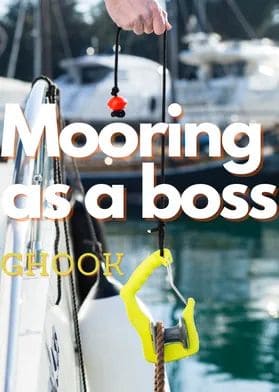Sale of Bow and Stern Fenders With Delivery
At our marketplace you can buy new bow and stern fenders at a low price for your yacht or boat, with a quality guarantee and delivery throughout Europe and the world. Our catalog contains only the best manufacturers and fenders that are used on a large number of yachts.
Don't know what fenders for the bow or stern of the boat to buy? Our staff will advise you before buying and suggest which fender is best suited for your yacht.
Why Use Fenders on the Bow and Stern of the Boat
In busy marinas, yachts, boats and catamarans are most often placed astern to the pier. On the one hand, this allows you to save space at the pier, where it can be quite crowded, and on the other hand, the captain and crew can quickly and conveniently go ashore, tie mooring lines to ducks, and the like.
You have to moor in reverse and in that case the load on the steering wheel is higher and helmsmen usually have less practice for such process. In an unfamiliar place, with changeable winds and difficult weather conditions, mooring can be a difficult task. And if you add to this the inertia of the course, because even a small yacht weighs as much as several Indian elephants, then there may even be a risk of collision with the pier.
Therefore, shipowners prefer to insure against such surprises and use special protective buffers - fenders.
They are mounted on the bow stem or the stern, and in the event of a collision, such devices take the hit. Often, fenders, even homemade ones, are made of elastic and springy materials such as high-damping rubber, flexible PVC or polyurethane foam. This allows you to absorb the impact and dissipate its kinetic energy.
Another important function of such devices is to protect the bow and stern of the boat from damage and abrasive damage after mooring. When docked, a change in wind direction, as well as ebbs and flows, create constant oscillation. If there is no damping pad between the ship's hull and the walls of the pontoons, then the stern will rub against the pier - the coating will peel off and the hull will receive dents and deep scratches.
Also, some special bow and stern fenders are used if it is necessary to tow boats and yachts. In this case, the fender is placed between the two vessels at the points of contact and the main load.
How to Choose Bow and Stern Fenders.
In contrast to the side protection of the ship, where cylindrical fenders dominate rather confidently, the protection of the stern and stem largely depends on the individual engineering configuration of the ship itself. Therefore, some types of stern fenders are not well suited for some types of boats.
There are several basic protective stern buffers for vessels of various designs:
Classic round fenders
Round fenders are suitable for mooring classic boats and sailing boats. Usually, two or three of these balls are hung from the stern on the ropes at the required height - they can practically float or be fixed quite high, closer to the corners. During the final stop, when the helmsman gives a strong forward momentum and the helm is not fixed straight, the stern can shift to the side, so you can’t do it with just one fender and it’s always worth protecting both stern bilges.
Such dampers are usually inflatable, made of durable rubber or wear-resistant PVC, and can have either one eye or two. Produced by manufacturers in a large assortment of sizes, material densities, chamber wall thicknesses, fastening strengths, as well as types of colors.
Specialized fenders
Many modern sailing yachts are produced with a cut transom at the stern and instead of a flat surface there is a voluminous protruding rib that cannot be saved from collision when using other types of fenders - they will slip or roll away. The same problem arises when you have to moor astern with the protruding bathing platform installed on the boat - it strongly protrudes forward and is the first to come into contact with the walls of the pier.
Manufacturers of fenders found a way out and proposed the use of a horizontally mounted segmented elongated fender. It overlaps the points of contact of the rib with other surfaces and takes all the impact.
They are most often made of very durable PVC, inflatable and many are additionally reinforced with stiffeners, have a reliable valve. In the designs described above, the boats have practically no alternative. The fenders can vary in length and diameter, as well as the method of attachment. There are methods involving fastening with four fastening rings, using a longitudinal eye for the entire length of the fender, etc.
Polyurethane foam fenders
In comfortable mooring conditions, equipped docks and when there is no need to worry about a long-distance voyage, many use sandwich plates, the surface of which is made of PVC for better wear resistance and the filling consists of polyurethane foam. Sometimes they are placed in two layers for greater distance between the stern and the pier and more reliable protection.
In the case of some popular catamarans, such as Fountaine Pajot's Lucia 40, we see a low and flat transom that is best protected with this type of shock absorber. Two securely fixed plates on the protruding parts provide convenient and safe docking.
Fenders to protect the bow are also found in several configurations:
Classic nasal
This is a fender in the form of a three-dimensional boomerang, which has two eyes at the ends and is tightly attached to the bow of the vessel. Designed for more traditional types of boats and is usually mounted almost to the very top of the bow. If you install it on the stem, you must correctly calculate or know exactly the point of impact.
Although some shipowners simply install two or three of these fenders along the entire height of the stem. It is simple and reliable in use, and also unpretentious to operating conditions.
Long bow fender
This is an elongated corner, most often inflatable and made of very durable PVC to withstand shock and friction. Protects the entire length of the stem and, unlike side fenders, can be constantly attached to the bow. During installation, the ropes are threaded through the longitudinal and transverse eyes, after which they are attached to the wefts.
Both in the case of boomerangs and oblong bow fenders, the internal angle of the device is fixed and the required size must be selected individually considering the sharpness of your stem. Manufacturers produce a fairly wide palette of such products and finding the right one is not difficult.
If desired, you can purchase bow fenders that are especially strong and durable, which is suitable if the captain plans to occasionally use his boat as a tugboat.
Multi-purpose inserts
It is also worth mentioning flexible fenders - these are bending fragmented pads, also called multifenders. They can be used both on a protruding rib at the stern, and in the case of a flat transom. They are also used to protect the nose if you bend it at the required angle and mount it to the stem.
Advantages and Disadvantages of Inflatable Fenders at the Stern and Bow of the Yacht.
The positive qualities of modern inflatable fenders largely depend on the materials used, and since the time of rope baskets, we have received high-quality rubber and polyvinyl chloride.
Their characteristics allow them to withstand much greater loads, constant friction and other damage. They are also completely immune to sea water and microorganisms teeming there, they do not germinate with algae and do not rot. They quite calmly tolerate exposure to sunlight, which cannot be said about foam plastic fenders - they quickly age under the influence of ultraviolet radiation, if they are not protected by some kind of shell.
On top of that, inflatable models are light, they are easy to move from the side board and can be mounted by just one person.
Perhaps their weakest point is the need to control the internal atmospheric pressure inside the chamber - when the ambient temperature changes or when exposed to direct sunlight for a long time, the air inside can both shrink and expand. This can even permanently deform the fender, so keep an eye on them.
How to Store
PVC inflatable fenders are not needy, can be stored both in a deflated and inflated state. Do not allow contact with open flames and aggressive chemicals such as acids or strong alkalis.
In many ways, this also applies to inflatable fenders made of rubber, but such fenders should also not be stored in very hot weather conditions - they can stick together when stacked on top of each other. Anything that accelerates the aging of rubber is undesirable.
In addition, in the case of foam fenders, keep them out of the sun and do not place heavy objects on them.


